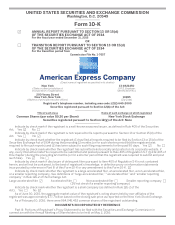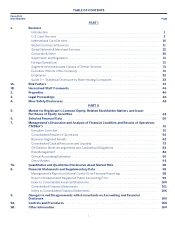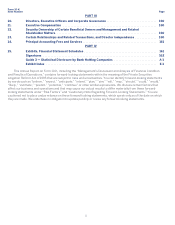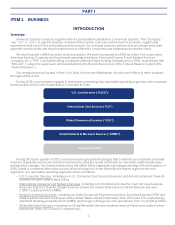American Express 2015 Annual Report Download - page 18
Download and view the complete annual report
Please find page 18 of the 2015 American Express annual report below. You can navigate through the pages in the report by either clicking on the pages listed below, or by using the keyword search tool below to find specific information within the annual report.
• Client managers for our top-spending and higher-revenue clients to support business growth
OPEN engages in advocacy efforts on behalf of small businesses. These advocacy efforts include our OPEN for
Government Contracting program to help small businesses learn how to obtain government contracts, programs
designed to help women entrepreneurs learn how to grow and sustain businesses, and our efforts to increase
awareness of the importance of small businesses in our communities generally. For example, in 2015 we led the sixth
Small Business Saturday®, a day to increase consumer awareness and patronage of local businesses and their role in
the economy and local neighborhoods. Small Business Saturday now takes place in the United States, the United
Kingdom and Australia, with similar initiatives in Israel and South Africa.
Card-Issuing Business — Competition
Our payment products face substantial and intense competition and generally compete with a wide variety of
financial payment products including cash, foreign currency, checks, debit, prepaid and ATM cards, bank accounts,
virtual currencies, alternative financial services such as check cashing and money orders, store-branded gift cards, other
network-branded credit and charge cards and other payment accounts and services. As a card issuer, we compete in the
United States with financial institutions that issue general-purpose charge and revolving credit cards (such as Bank of
America, Capital One Financial, Citibank, Discover Financial Services and JPMorgan Chase). We also encounter
competition from businesses that issue their own private label cards or otherwise extend credit to their customers, such
as retailers and airline associations, although these cards are generally accepted only at limited locations. We face
increasing competition for cobrand relationships, as both card issuer and network competitors have targeted key
business partners with attractive value propositions for access to high-spending loyal customers. For example, although
we competed aggressively to renew our cobrand and merchant acceptance agreements with Costco Wholesale
Corporation in the United States, we were unable in the end to reach terms that would have made economic sense for our
Company and our shareholders and in February 2015, we announced that such agreements are set to end in 2016.
The largest competing issuers have continued to grow, in several cases by acquiring card portfolios, and also by
cross-selling through their retail branch networks. Competing card issuers offer a variety of products and services to
attract cardholders, including premium cards with enhanced services or lines of credit, airline frequent flyer program
mileage credits, cash rebates and other reward or rebate programs, services for small business owners, “teaser”
promotional interest rates and rewards points for both credit card acquisition and balance transfers, and cobranded
arrangements with partners that offer benefits to cardholders.
Most financial institutions that offer demand deposit accounts also issue debit cards to permit depositors to
access their funds. Use of debit cards for point-of-sale purchases has grown as most financial institutions have
replaced ATM cards with general-purpose debit cards bearing either the Visa or MasterCard logo. Debit cards were
historically marketed as replacements for cash and checks, and transactions made with debit cards have typically
been for smaller dollar amounts. However, debit cards are increasingly perceived as an alternative to credit or charge
cards and used in that manner. Additionally, overdraft accounts can be used by our competitors to extend credit to
customers when transaction values exceed monies available in a linked demand deposit account.
As the payments industry continues to evolve, we are also facing increasing competition from non-traditional
players, such as online networks, telecommunication providers and software-as-a-service providers, which leverage
new technologies and customers’ existing charge and credit card accounts and bank relationships to create payment
or other fee-based solutions. In addition, the evolution of payment products in emerging markets may be different
than it has been in developed markets. Instead of migrating from cash to checks to plastic, technology and consumer
behaviors in these markets may result in the skipping of one or more steps to alternative payment mechanisms such
as mobile payments. For a further discussion of the evolving competitive landscape in the payments industry, see
“Global Network & Merchant Services — Competition” under “Global Network & Merchant Services.”
The principal competitive factors that affect the card-issuing business include:
• The features, value and quality of the products and services, including customer care, rewards programs,
partnerships, benefits and digital resources, and the costs associated with providing such features and services
• The number, spending characteristics and credit performance of customers
• The quantity, diversity and quality of the establishments where the cards can be used
• The pricing, payment and other card account terms and conditions
• The number and quality of other payment cards and other forms of payment, such as debit cards and electronic
wallets, available to customers
• Reputation and brand recognition
• The success of marketing and promotional campaigns
• The nature and quality of expense management data capture and reporting capability, particularly for small
businesses
7
























